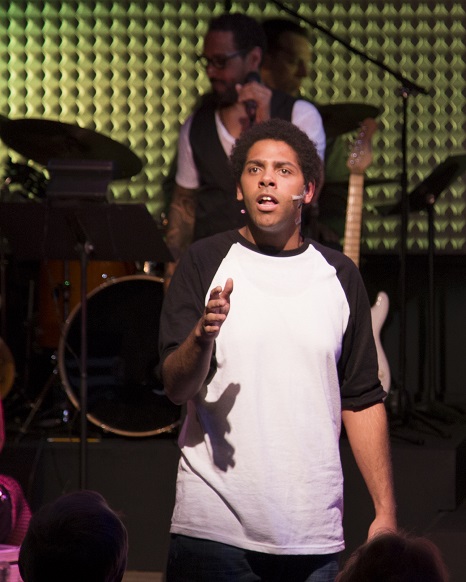Passing Strange
ACT Theatre, 700 Union St., 292-7676, acttheatre.org. $20–$40. Runs Wed.–Sun. Ends June 29.
Rock & roll doesn’t translate well to the theater. The whole idea of a script is antithetical to the kind of spontaneity—real or imagined—that makes for a great rock show. Then there’s the issue of volume, of particular concern when a stage band performs in a small space with questionable acoustics. They’ve got to play loud enough to relate the musical-autobiographical tale that is Passing Strange, but quiet enough for you to hear the dialogue. That’s the dilemma in ACT’s Bullitt Cabaret, where a PA announcement first asks you to turn off your cellphones, then declares, “Let’s rock & roll!” Cringe.
And yet this local revival of the 2008 Tony winner works really well, conveying the life-altering qualities of sex, drugs, and rock & roll without needing to turn the volume up to 11. The inaugural production of Sidecountry Theatre, directed by Tyrone Brown, this show is ambitious and, at times, rushed during its two and one-half hours (with intermission). And occasionally, yes, the band overwhelms the dialogue. But when it takes time to breathe—particularly when its young protagonist is exploring his art or when the characters are experimenting with drugs—the stage floods with a powerful mix of emotion, angst, and humor.
Created by the musician-turned-playwright named Stew (with Heidi Rodewald and Annie Dorsen), Passing Strange is basically his life story, though his character is never named. His journey starts in 1976 South Central L.A. before twisting through the marijuana cafes of Amsterdam and the riot-torn streets of Berlin. Our protagonist narrates his path, interspersed with songs and episodes from his life (enacted by a cast of six).
The main role originated with Stew, obviously, and here his shoes are remarkably filled by first-time actor LeRoy Bell, the veteran local R&B singer who had a moment of fame on The X Factor some years back. Bell, a black musician who grew up middle-class, like Stew, is a perfect fit for the role. Even if he’s a little older, at 62 (though looking far younger with his muscles and tats), he came of age in the same era as Stew. This might explain his ease with the material.
The fact that Bell, a professional musician, can sing these songs with nuance and grace is easy to take for granted. You’d almost think they were his own, not written by Stew and Rodewald.
That ease continues into Bell’s droll narration, so comfortable and relaxed that it’s easy to think he’s riffing on his own life—until a reference to a New York street gives the script away. And when the play’s emotional heft lands on his shoulders alone in the final moments, he carries it to the end, capping an impressive performance.
mbaumgarten@seattleweekly.com








